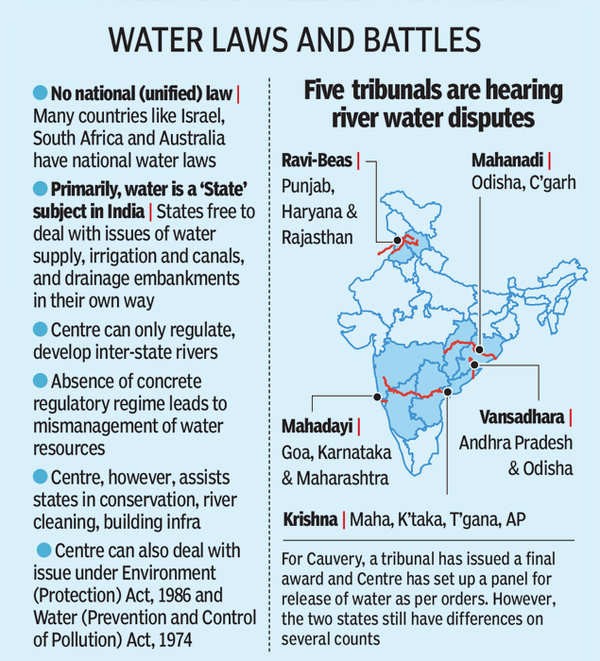A Fresh look at water policy
Relevance: GS – 2 – Important aspects of Governance, Transparency and accountability
Why in the News?
- India’s water technocracy system has challenged the adoption of emerging global models of sustainable water management.
- Water should be considered as an important dynamic resource for the ecological water cycle.
- It should not be seen as merely a convenience of consumer goods.
National Water Policy and Governance Model
- The Mihir Shah-led committee formed to formulate the 2019 National Water Policy submitted its report nearly four years ago.
- Since then, the draft plan has remained dormant and not released to the public.
- Preserving the system is a concern because the modernized, innovative approach to water management is costing the state.
- The shift towards new ways of thinking about the future is important considering the challenges of the future, India’s Vision of Viksit India and India Water Vision 2047.
Water governance model conflict
- India experienced a quiet struggle between two competing water policies:
- Colonial engineering model: Focuses on structural interventions to increase water supply, such as building dams.
- A holistic water governance model: integrating social environmental considerations for comprehensive water management.
Integrated Water Management (IWRM)
- IWRM provides a systematic approach to water management, a holistic framework based on cross-disciplinary knowledge.
- Unlike the definition of global water sharing, this version of the IWRM provides broad guidelines for alternative governance arrangements.
- It combines multiple disciplines, including natural, social and decision sciences, and incorporates a water-energy-food nexus approach.
- Global trends and lessons
- Over the past 40 years, global water management has changed from traditional approaches to improving supply to innovative approaches to demand management.
- The EU and the U.S. has recognized environmental degradation through massive dam construction and architectural interventions, causing irreversible damage to river ecosystems.
Decommissioning dams: A Global Effort
- The EU Water Framework Directive (2000) released about 500 dams in France, Sweden, Finland, Spain and the UK to restore natural flows
- Once upon a time, the U.S. and a strong advocate of dam construction (1920s-1960s) has decommissioned more than 1,000 dams in recent decades to rejuvenate the reservoir ecosystem
- New methods of water management
- Chile and Australia are introducing market-driven solutions that increase farmers’ access to water and contribute to water management.
- California began marketing commodities in 2019 to mitigate water risk.
- Opposition to and reform of Indian water governance
- India’s water technology system has actively resisted the global shift towards a new paradigm of sustainable water use.
- Despite this opposition, recent initiatives have attempted to push the country towards full water governance:
- Two pieces of legislation were passed in 2016: Draft National Water Policy Act and Groundwater conservation, conservation, regulation and management model Act 2016
- In 2016, a report titled ‘21st Century Institutional Architecture for India’s Water Reforms’ recommended dissolving the CWC and CGWB to create a National Water Commission, but this water engineering initiative has come under heavy criticism
-
New Water Policy: Necessary Changes
India’s increasing reliance on structural interventions on water systems has raised several issues:
- Interstate Cauvery Dispute
- Floods in Bihar, reportedly caused by Farakka river in West Bengal
- Temporary hydroelectric projects in the Himalayas
- Potential environmental consequences from river linkage projects
Integrated Systems Approach: Fundamentals
- Active water component: Water should be considered as an integral part of the ecological water cycle, not just as a resource for human consumption.
- Intrinsic value of water: Ecosystem services and water use should be identified through ecosystem services associated with flow regimes assessments
- Economic Assets: Water should be treated as an economic asset in the natural economy, supported by institutional mechanisms that balance value with affordability, accessibility and equity.
- The river as a governance unit: The core of water management should be the river.
- Focus on water conservation strategies: Increasing water supply is not necessary for economic growth or food security; Focus should be on water conservation methods.
- Comprehensive project analysis: A water development project should consider the entire ecological cycle to maintain integrity.
- Interdisciplinary knowledge: Governance must rely on explicit, interdisciplinary knowledge including engineering, natural sciences, economics and social sciences.
- Role of droughts and floods in nature: Droughts and floods are an integral part of the ecological water cycle, not just extreme events.
- Gender considerations: The important role of women in water policy, as highlighted in the Dublin Declaration, which recognises that “women play a central role in the provision, management, and safeguarding of water”.
The Urgency of the Policy Debate
- These remarks illustrate the broad outlines of the emerging model of water governance, and reflect current sophisticated thinking.
- However, this policy will need to be modified as more knowledge is gained and evolving needs are met.
- It is important that the draft National Water Policy be brought to the attention of the public to assess whether these principles have been incorporated.
- The draft plan must be discussed and debated in order to refine and improve it.
- The immediate challenge facing India is that ensuring water security and timely action is critical to human needs and environmental stability.
Alternative articles
https://universalinstitutions.com/preparing-india-for-water-stress-climate-resilience/
https://universalinstitutions.com/keep-water-at-the-centre/
Source:https://www.thehindubusinessline.com/opinion/a-fresh-look-at-water-policy/article68664900.ece
Mains question
Critically evaluate the shift from the colonial engineering paradigm to an integrated systems approach in India’s water governance. Discuss the key challenges and opportunities for ensuring sustainable water security. (250 words)






